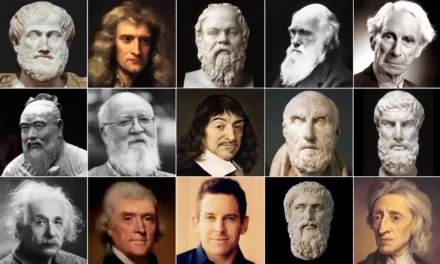
14 strategies to avoid being misled by the news media
O
ne of the aspects of becoming a better critical thinker is to learn how to identify when and how newscasters, media we consume from all sorts of sources, and politicians are manipulating us. Today we are going to focus on how the news media influences us. This is going to be helpful to you regardless of whether you are a news junkie or you don’t even own a TV set. The reason why is because the media’s influence is pervasive at all levels of our life. It may not be influencing you directly, but it’s certainly influencing your children’s teacher, your spouse, your congressman and your priest. You may never turn the news on, but most other people certainly do. Today you will learn how this works and some of the things to keep your eye open for to avoid being manipulated or influenced by it.
Once you understand this it will be like learning the trick the magician performs on stage. Once you understand how it’s done, how it works on you, the magic is gone. The trick ceases to have the same effect on you.
So, get ready to unmask some of the techniques these professional manipulators use, and learn the antidote to fight them. I think you are going to love it!
The media’s influence is pervasive at all levels of our life. It may not be influencing you directly, but it’s certainly influencing your children’s teacher, your spouse, your congressman and your priest.
Since the news media is driven by profits, it needs to present the news in ways that are appealing and understandable to their audience.
In every country of the world prevailing cultural norms and socioeconomic characteristics influence and mold the news media. This makes perfect sense since the people who work in the news media share the same views as their audience. This is also the case because they need to sell the kinds of products or services the people in their audience want to buy. Now, since the news media is driven by profits, it needs to present the news in ways that are appealing and understandable to their audience. One common technique they use is to be alarmists. Pay attention next time you watch the news and you’ll see a common pattern where things tend to sound pretty bad: the threat of terrorism is increasing; the crime rate continues to go up while police brutality continues unabated, the stock market is going down. And so on and so forth.
Typically there are a few mechanisms at work in the coverage from the mainstream news media in any culture. These mechanisms may operate at an unconscious level, but regardless the consequences are that the public gets a biased perspective of reality.

First, oftentimes, the stories that are presented as the most important are those that are the most negative, most interesting, or most sensational to the news media audience. Now, you may think that news coverage of celebrities, lifestyle and entertainment is important, or you may think or like coverage of sensational sex, crime or court stories, and that’s why very frequently these stories take all the time and space in the news to the detriment of news of real weight and value, such as important political or cultural world events or discoveries in science.
Second, in the news coverage, some countries are praised while some others are criticized. Once you start paying attention to this you’ll notice that typically the countries that deserve praise are those that are friendly to us, while those that deserve criticism are those that are unfriendly to us.
Third, news coverage often presents things as the way things are. However, this only happens because that’s how things appear to them from their point of view. If the thing in question, such as an event, for example, was looked at from a different perspective, it would likely be presented differently. Perhaps not as a fact, not as if that was the way it is, but rather it would be presented with a different meaning.
Fourth, when the news media evaluates stories, they may look for the facts that support their views. Typically, these are the facts that will be presented as the most important or relevant facts. But they may be irrelevant or unimportant when looked at from a different perspective.

DON’T LET PEOPLE INFLUENCE YOU WITHOUT YOU EVEN REALIZING!
Enter your information to get our FREE practice exercises so you can train yourself to recognize subtle persuasion techniques.
News media is presenting a biased reality to its audience, while of course trying to persuade you they are neutral and unbiased. What you perceive of what’s going on, if you watch uncritically, is a reflection of what the news media wants you to know.
So, what can we do? How are we to interpret the information we are being fed? Well, as always you should evaluate all information critically. In this particular case, it will be helpful to be in the lookout for certain patterns.
For instance, next time you read the news pay attention to the order of the articles. Notice how articles that are not really that important appear firs, while more important articles are presented later.
Also, notice how the news media often targets whatever stories they can sensationalize, and how they focus on stories their audience would find sensational, while ignoring or minimizing stories that are truly important or deep. You will often find important world problems are ignored or downplayed while sensational or ultimately unimportant stories are highlighted.
Note how so-called friends of our country are typically presented positively while our so-called enemies are presented negatively.
Notice how newscasts oversimplify complex issues.
Pay attention to how they create and foment social unrest by overexploiting stories typically revolving around sexuality or criminal behavior.
14 strategies you may use to see through the news media
- When you consume news stories, take the time to evaluate them for their clarity, accuracy, relevancy, significance, depth and breath.
- When you hear a news story consider how it would be told from other perspectives. Always study alternative perspectives and worldviews.
- Try to learn about the reality that surrounds you from multiple sources of thought and information, instead of relying exclusively on the news media.
- When you hear a news story, identify the viewpoints embedded in them. Think about whether the story would be presented differently from another viewpoint.
- Understand that the news stories you read or hear are almost certainly a combination of fact and interpretation, which means they ultimately are just one way of interpreting reality.
- Notice inconsistencies and contradictions in the news. Many times stories are put together from multiple sources and the message is contradictory.
- Try to identify the agenda or interests a particular story may serve. Do what lawyers do: ask yourself the question, “Who benefits?” Another way to see this is “Follow the money”.
- Notice what may be explicitly omitted and yet implied. This is typically an indication that someone wants you to think in a certain way.
- Notice that some facts may be covered while others may be ignored. Ask yourself why.
- Pay attention to which points of view are systematically presented favorably and which unfavorably. Again, this will typically reflect the presenter’s bias.
- Observe that some times social conventions or taboos are used inappropriately to define issues as unethical. Here’s a clear case of the newscaster trying to imprint his bias on you.
- Notice and decide if things that are represented as fact should instead be presented as debatable or as opinion.
- Pay attention to the assumptions implicit in stories.
- When you hear stories that show a bias towards the sensational, overly dramatic, or unusual, mentally put them into perspective or discount them outright.
So, there you have it. That’s a brief overview of how the news media may distort reality or manipulate or mislead you.
So, at this point the big question is, how does all this apply to you? How are you going to use this? You probably fall into one of the following categories:
- You never watch or read the news media
- You watch or read the news but it doesn’t seem to have any effect on you
- You watch or read the news and you end up being agitated by it

If you are in the first group, that is, you do not watch the news, you may think you need not care about any of this. But you would be wrong, because even if you do not watch the news at all, you do not live in a vacuum. You still one way or another hear what’s going on. You talk to friends or colleagues. You talk to someone in the coffee shop or gym. You see the headlines in the newspapers as you walk by the magazine stand. Your phone brings up news alerts. Look, unless you are a hermit living in a remote cave, it’s very hard to really stay away from all this. So, you need an antidote.
Even if you are in the second category, that is, you watch the news but you feel you are above being influenced by it, think again. News media is presenting a biased reality to its audience, while of course trying to persuade you they are neutral and unbiased. What you perceive of what’s going on, if you watch uncritically, is a reflection of what the news media wants you to know. It may or may not be a true reflection of what is really important, or may or may not be an objective and unbiased perception of reality. You may end up thinking that things are really bad, when in reality you were just presented with sensational and negative things. So, whether you like it or not, you are being influenced by the news media. In other words, you still need an antidote.
And, if you are in the third category, that is, you are whipped up into a state of hysteria by the mass media and you are always worried about crime, terrorism, corruption, drugs, and any other number of bad things, well, needless to say, in this case you definitely need an antidote too!
Well, if you fall into any of these categories I gave you the antidote already. I gave you some strategies you can actually use to avoid being misled or scared by the news media. You may start applying these strategies today and if you are intentional about applying them regularly and systematically, you will notice you will become impervious to the effect the news media has on you in a short time.

DON’T LET PEOPLE INFLUENCE YOU WITHOUT YOU EVEN REALIZING!
Enter your information to get our FREE practice exercises so you can train yourself to recognize subtle persuasion techniques.







0 Comments